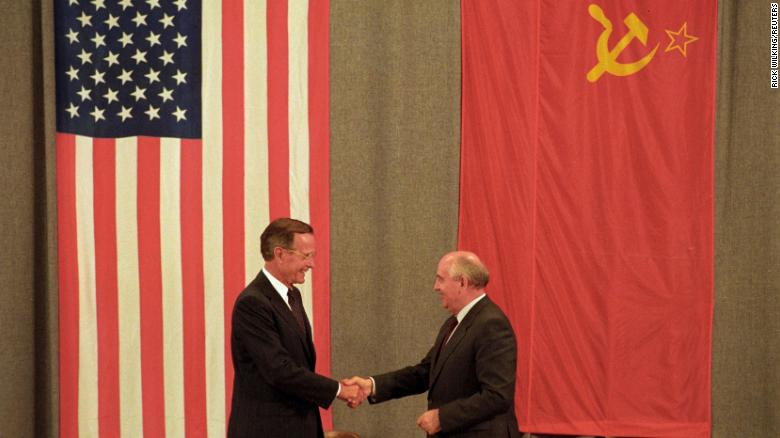
President Ronald Reagan famously called on Soviet leader Mikhail Gorbachev to "tear down this wall" -- the Berlin Wall. But the wall actually came down early in the presidency of George H.W. Bush, in November 1989.
During his four years in office, Bush presided over the end of the Cold War: He was president during the reunification of East and West Germany, the dissolution of the Warsaw Pact alliance and the withdrawal of Soviet forces from Afghanistan in February 1989, shortly after he took office on January 20, 1989.
On July 31, 1991, weeks before the failed August coup against Gorbachev, Bush signed the START I treaty in Moscow. The agreement introduced major reductions in US and Soviet strategic nuclear arsenals.
The following day, on August 1, 1991, Bush gave a speech in Ukraine, where he warned against "suicidal nationalism." Conservative New York Times columnist William Safire derided it as the "Chicken Kiev" speech, delivered just a few months before Ukraine won independence and the Soviet Union collapsed.
At the time, it would have been difficult to predict that the USSR would collapse so precipitously -- and relatively peacefully. The collapse of Yugoslavia had already begun at that point, and the prospect of a similarly violent breakup of the nuclear-armed Soviet empire worried policymakers.
During the failed August putsch, Bush supported Gorbachev and condemned the coup attempt, which accelerated the collapse of the USSR.
In a statement to the Russian news agency Interfax on Saturday, Gorbachev expressed "deep condolences" to Bush's family and to all Americans following the news of the former President's death.
"I have a lot of memories associated with this man," Gorbachev said. "We had a chance to work together during the years of tremendous changes. It was a dramatic time that demanded great responsibility from everyone. The result was an end to the Cold War and the nuclear arms race."
Bush's presidency saw another symbolic milestone in the end of the Cold War arms race: the end of US nuclear-weapons testing. On September 23, 1992, the United States conducted its last underground nuclear weapon test at the Nevada Test Site.
The end of the Cold War at first seemed to reduce the prospect of nuclear Armageddon. But nuclear dangers persist: Rivals India and Pakistan tested nuclear devices in 1998, provoking global outcry; North Korea also joined the nuclear-armed club.
